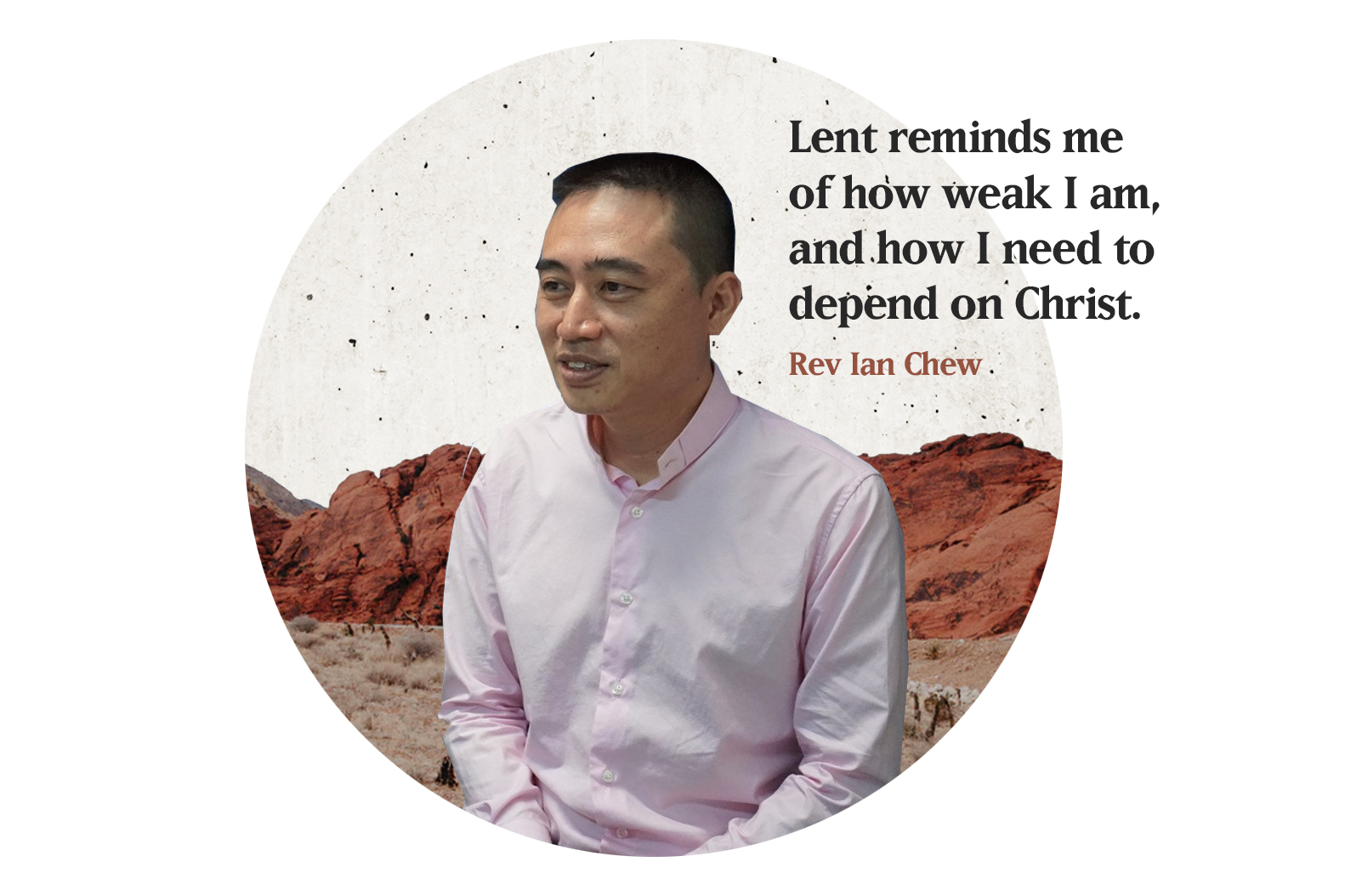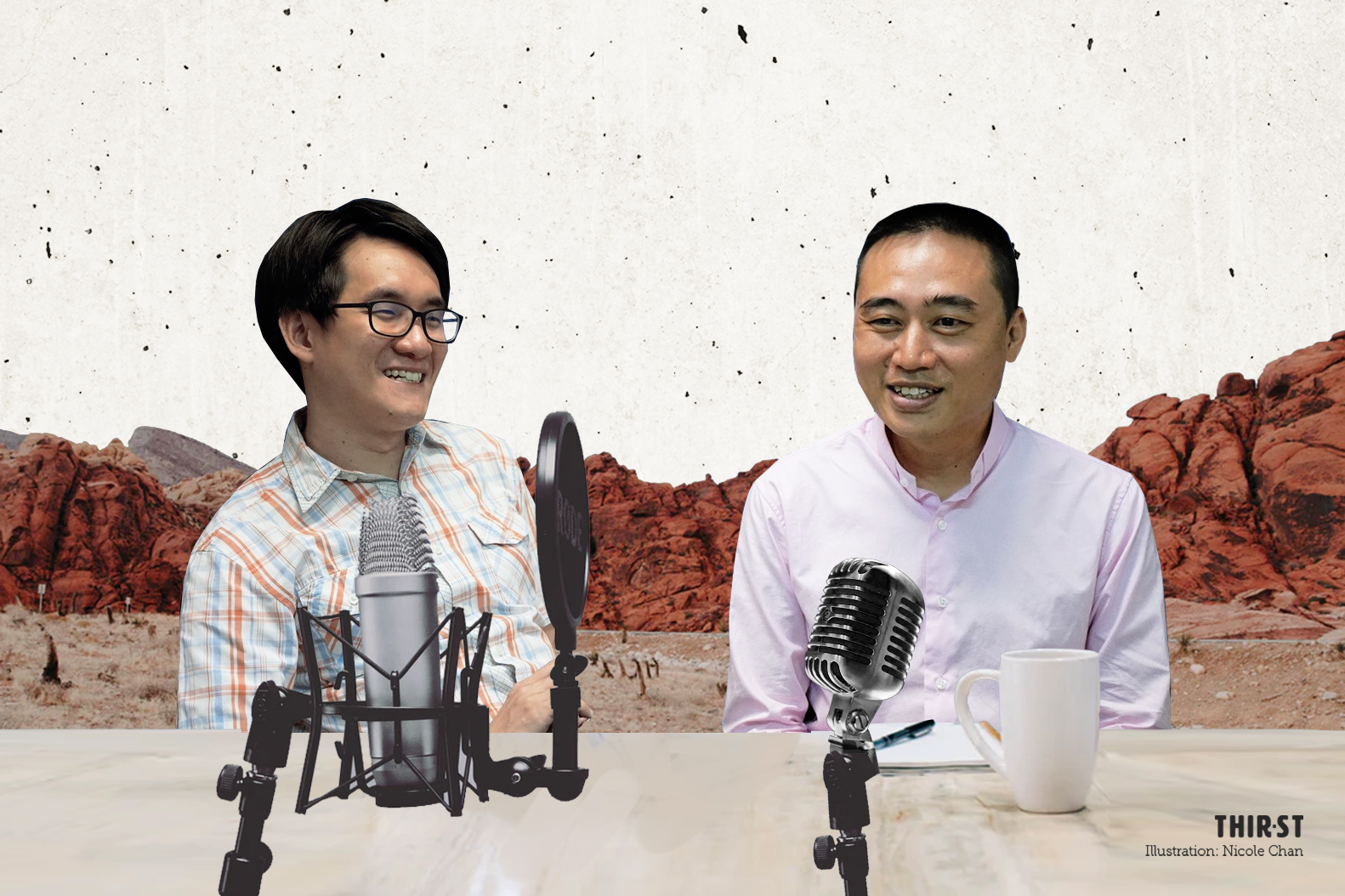WHAT IS LENT ALL ABOUT?
Pastor Ian: Lent is a 40-day preparation for Easter. During these 40 days, we identify ourselves with Jesus who went through a 40-day fast (Luke 4:1-13).
We find the number “40” very significant throughout Scripture. For example, Moses was with the Lord on Mount Sinai for 40 days (Exodus 32) and the Israelites were wandering for 40 years before they entered the Promised Land (Numbers 14).
So “40” is a very significant number. And the Church uses this length to prepare ourselves for Easter.
Gabriel: It begins on Ash Wednesday and ends on Holy Saturday. Sunday itself is Easter. It’s 40 days – not including Sunday because we don’t fast on Sundays.
Since it’s a preparation, most Christians will then practise some form of fasting.

HOW DID THE PRACTICE OF LENT COME INTO THE CHURCH?
Gabriel: Easter is the highest point or greatest festival within the Church calendar. And during Easter, we celebrate the resurrection of Christ.
In order to enter into a fuller celebration of any major festival, sometimes it’s good for us to prepare ourselves – we deprive ourselves from what we normally enjoy or do, to anticipate something that is very significant.
For the early Christians – pre-Constantine time – people who came into the faith knew exactly what they were coming in for. They saw Christians being martyred, denied their rights and their families being killed. They were made spectacles in the Colosseum. So people didn’t come into the faith because they wanted a better life.
But when Constantine came and made being Christian favourable, the floodgates were opened and many people wanted to become Christians. So the early Church felt that there was a need for people to know and prepare themselves for what a Christian life is really like.
The element of self-denial still needs to be there right? Remember, Jesus talked about how anyone who wants to follow Him must deny themselves (Matthew 16:24).
So they had this primarily for the baptismal candidates. Roughly 40 days of fasting – they weren’t very fixated on the number from the start – to prepare them to understand what Christianity was about.
Pastor Ian: Going back to the early Church… (Lent) was not only for the baptismal candidates. The whole Church participated in that as well. It’s specifically for the baptismal candidate, but generally for the whole congregation. To prepare themselves for the resurrection of Christ.
WHAT’S YOUR OWN EXPERIENCE OF LENT?
Gabriel: I have fasted from a meal before. I have also fasted from various sources of entertainment like social media and games. But to say it’s a spiritual discipline is somewhat misleading too. Because it’s not so much of self-cultivation, but a reorientation.
When you fast from entertainment, you remember that God is your source of joy. So I took the time that I saved and replaced it with something else.
Or when I fast from food, I remember that God is the One who provides. I take the money that I save and I give it to someone else. So it’s not just a self-denial, but it’s a movement towards the Kingdom of God, towards His mission and His purpose.
Pastor Ian: Lent reminds me of how weak I am, and how I need to depend on Christ. And how sometimes in my life, I depend on my own strength and I forget that Jesus has provided grace for me and He calls me to perhaps another plane of living.
Failing is also a very crucial part of Lent as well.
I do that in very practical ways. I stop doing something that I may normally do. And it can be something as simple as changing my thought processes or even just avoiding a certain kind of food.
I did come to a stage where I realised that I’m critical of people and I may look at the negative side of people or situation. But that is not what Christ wants for us in the Christian life. And I know this because His Word says give thanks in all circumstances, for this is His will for us (1 Thessalonians 5:18).

So Lent doesn’t have to be very big things. It can be something you consciously develop in your own life, like a habit of thanksgiving and stopping ourselves from complaining and watching our attitudes. All with the Spirit’s help.
Failing is also a very crucial part of Lent as well.
As we fail in keeping to our commitments during Lent, we realise how weak we are and how we need the grace of God. And through these supposed failures, we actually grow in our spiritual life. We receive the grace of God in our lives.
DOES OBSERVING LENT GET OLD?
Gabriel: I wouldn’t say that I look forward to Lent. I somewhat dread it because it’s difficult and challenging. Having said that, it shouldn’t be too challenging, you know?
If you’re doing something and failing every day, maybe you should do something more manageable. Do something that is difficult, that you know will push you towards God’s love – not so that it crushes you like a burden.
Lent serves as a chiropractic effect – it moves your bones around and sets you back.
It goes back to Augustine of Hippo and how we define sin. He defines it as disordered love – where we love things in the wrong order. Like I’m supposed to love my children more than my entertainment, but it’s the other way round.
Lent serves as a chiropractic effect – it moves your bones around and sets you back. Not perfectly because you’re just choosing one or two things. But you realise there are so many things we need to set right before God.
The world continually sucks us into its orientation, and as Singaporeans we know that what the world proclaims is the most important right? But the Kingdom of God is entirely different, and we’re called to continually reorder our lives towards that. So it should never be stale.
Pastor Ian: On the contrary, I feel that it’s fresh all the time. Personally, I do look forward to Lent, to a time where together with the entire Church I reorientate myself to God because I don’t know how far I’ve strayed from God.
Our daily lives are so full of activities and responsibilities, and we just continue each day. But during this period, we just orientate our lives towards God.
The Kingdom of God is entirely different, and we’re called to continually reorder our lives towards that.
We deprive ourselves intentionally and learn how much we have strayed away. It’s a time of revelation; it’s also a time of strengthening. It’s a time where we can be vulnerable and bare before God as well.
It’s impossible to understand Lent, or for that fact any of the different seasons of the Church calendar in just one year.
So we actually grow deeper and deeper (in understanding), and this is (true for) our Christian walk as well. We progress step by step; we don’t leap from one stage to another.
To listen to the full podcast, head over to St Andrew’s Cathedral’s website. You can also subscribe to The Cathedral Podcast on iTunes, Spotify and Google.
And if you’re looking for a Lent Devotional to help with your quiet time, From Fear to Faith – Covid-19 Edition was specially produced with this season in mind. Developed by The Bible Society of Singapore and commissioned by the National Council of Churches of Singapore, it features reflections from various Christian leaders across different churches and denominations.
- Is your life orientated towards or away from God?
- Do you observe Lent? Why or why not?
- What are some steps you can take to prepare for Easter and the celebration of the resurrection of Christ?









